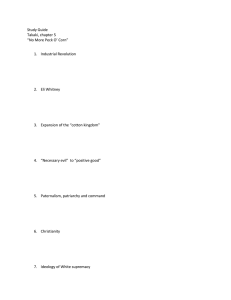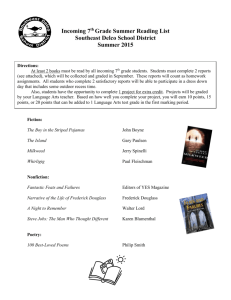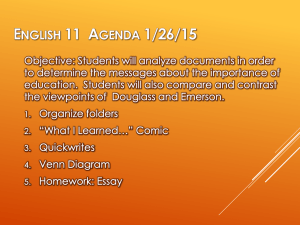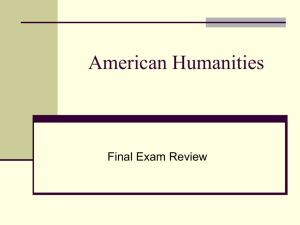1849. Frederick Douglass and Henry Garnet Debate Strategy
advertisement
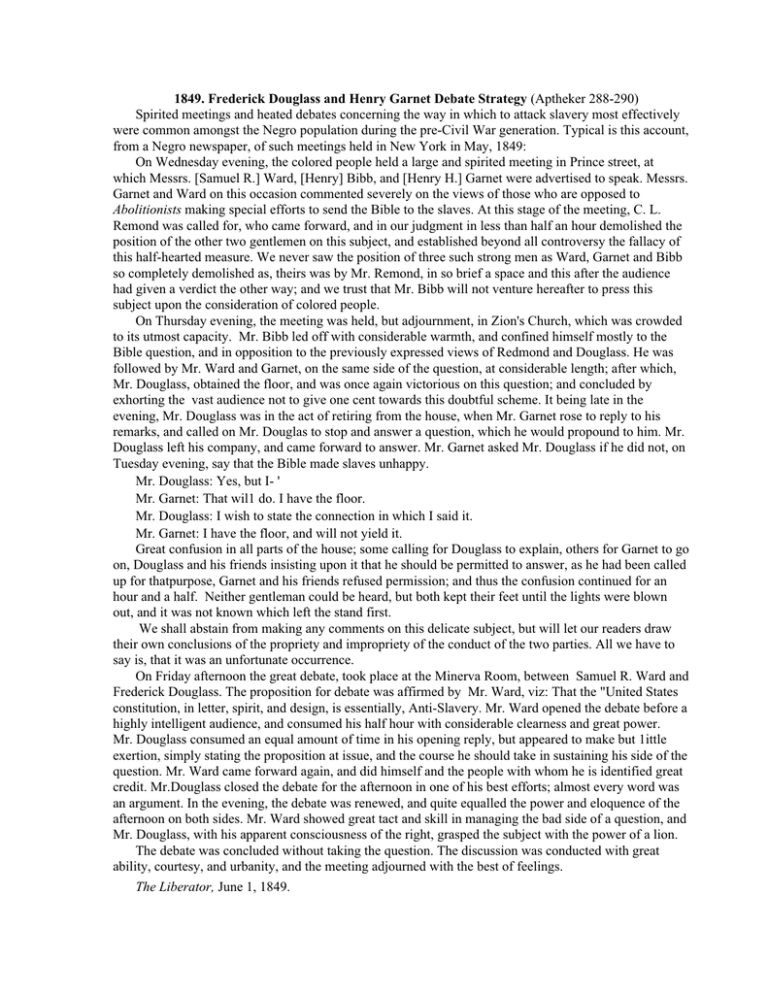
1849. Frederick Douglass and Henry Garnet Debate Strategy (Aptheker 288-290) Spirited meetings and heated debates concerning the way in which to attack slavery most effectively were common amongst the Negro population during the pre-Civil War generation. Typical is this account, from a Negro newspaper, of such meetings held in New York in May, 1849: On Wednesday evening, the colored people held a large and spirited meeting in Prince street, at which Messrs. [Samuel R.] Ward, [Henry] Bibb, and [Henry H.] Garnet were advertised to speak. Messrs. Garnet and Ward on this occasion commented severely on the views of those who are opposed to Abolitionists making special efforts to send the Bible to the slaves. At this stage of the meeting, C. L. Remond was called for, who came forward, and in our judgment in less than half an hour demolished the position of the other two gentlemen on this subject, and established beyond all controversy the fallacy of this half-hearted measure. We never saw the position of three such strong men as Ward, Garnet and Bibb so completely demolished as, theirs was by Mr. Remond, in so brief a space and this after the audience had given a verdict the other way; and we trust that Mr. Bibb will not venture hereafter to press this subject upon the consideration of colored people. On Thursday evening, the meeting was held, but adjournment, in Zion's Church, which was crowded to its utmost capacity. Mr. Bibb led off with considerable warmth, and confined himself mostly to the Bible question, and in opposition to the previously expressed views of Redmond and Douglass. He was followed by Mr. Ward and Garnet, on the same side of the question, at considerable length; after which, Mr. Douglass, obtained the floor, and was once again victorious on this question; and concluded by exhorting the vast audience not to give one cent towards this doubtful scheme. It being late in the evening, Mr. Douglass was in the act of retiring from the house, when Mr. Garnet rose to reply to his remarks, and called on Mr. Douglas to stop and answer a question, which he would propound to him. Mr. Douglass left his company, and came forward to answer. Mr. Garnet asked Mr. Douglass if he did not, on Tuesday evening, say that the Bible made slaves unhappy. Mr. Douglass: Yes, but I- ' Mr. Garnet: That wil1 do. I have the floor. Mr. Douglass: I wish to state the connection in which I said it. Mr. Garnet: I have the floor, and will not yield it. Great confusion in all parts of the house; some calling for Douglass to explain, others for Garnet to go on, Douglass and his friends insisting upon it that he should be permitted to answer, as he had been called up for thatpurpose, Garnet and his friends refused permission; and thus the confusion continued for an hour and a half. Neither gentleman could be heard, but both kept their feet until the lights were blown out, and it was not known which left the stand first. We shall abstain from making any comments on this delicate subject, but will let our readers draw their own conclusions of the propriety and impropriety of the conduct of the two parties. All we have to say is, that it was an unfortunate occurrence. On Friday afternoon the great debate, took place at the Minerva Room, between Samuel R. Ward and Frederick Douglass. The proposition for debate was affirmed by Mr. Ward, viz: That the "United States constitution, in letter, spirit, and design, is essentially, Anti-Slavery. Mr. Ward opened the debate before a highly intelligent audience, and consumed his half hour with considerable clearness and great power. Mr. Douglass consumed an equal amount of time in his opening reply, but appeared to make but 1ittle exertion, simply stating the proposition at issue, and the course he should take in sustaining his side of the question. Mr. Ward came forward again, and did himself and the people with whom he is identified great credit. Mr.Douglass closed the debate for the afternoon in one of his best efforts; almost every word was an argument. In the evening, the debate was renewed, and quite equalled the power and eloquence of the afternoon on both sides. Mr. Ward showed great tact and skill in managing the bad side of a question, and Mr. Douglass, with his apparent consciousness of the right, grasped the subject with the power of a lion. The debate was concluded without taking the question. The discussion was conducted with great ability, courtesy, and urbanity, and the meeting adjourned with the best of feelings. The Liberator, June 1, 1849.
